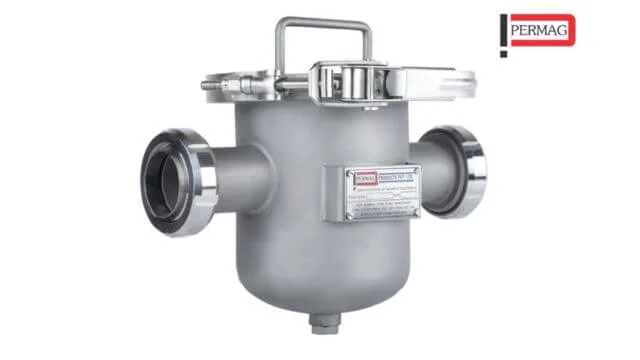In today’s fast-paced industrial background, optimizing the efficiency and performance of magnetic equipment is critical. Many of the materials produced by industries are not free of impurities that might damage equipment and lower standards for finished goods.
The use of magnetic filters has become increasingly popular as a means to boost the effectiveness of manufacturing operations. These filters use magnetism to effectively trap and discard any ferrous or weakly magnetic debris, guaranteeing a trouble-free run.
They are able to filter out virtually all ferrous particles, even the tiniest ones. This means they can reduce the amount of filter waste, save money on filter consumables, and boost both fluid and product quality. As an added bonus, they provide constant filtering. They are beneficial to the environment since they cut down on the use of fluids and the disposal of waste, some of which is poisonous.
Magnetic filters are composed of powerful magnets arranged in a system’s fluid flow path. Magnets like this can capture ferrous and weakly magnetic pollutants and keep them from entering the water supply. The magnetic strength, filter size, and design of magnetic filters are all modifiable to meet a wide range of processing needs.
Magnetic Filters Improve Efficiency and Performance
Product quality improvements
Magnetic filters are essential in areas where product quality is critical. These filters ensure high-quality goods by eliminating impurities from raw materials or process fluids. Magnetic filters, for example, successfully remove metal pieces in the food and beverage business, assuring consumer safety and meeting high quality standards. Similarly, magnetic filters prevent contaminants from compromising the integrity and purity of final products in the pharmaceutical and chemical industries.
Contaminant elimination
The efficient removal of pollutants from industrial fluids is one of the key tasks of magnetic filters. Iron filings, corrosion, and metal shavings may wreak havoc on machinery, resulting in malfunctions, additional maintenance, and decreased production. Magnetic filters serve as the first line of defense, catching impurities and preventing them from causing downstream damage. Magnetic filters help to the smooth operation of pumps, valves, and other vital components by keeping the fluid clean.
Reduced downtime
In industrial operations, regular maintenance and unplanned downtime are key cost issues. Magnetic filters help to reduce unscheduled downtime and boost overall operational efficiency by preventing contamination-related failures. The lack of impurities also extends the life of machinery, lowering the frequency of repairs and replacement and, as a result, resulting in significant cost savings.
Optimized flow rates
Contaminants in industrial fluids can induce flow limitations, resulting in lower flow rates and poor process performance. By catching and holding ferrous particles, magnetic filters eliminate this issue. These filters optimize flow rates by maintaining a clear flow route, increasing the efficiency and productivity of industrial processes.
Improved equipment security
Magnetic filters remove ferrous and weakly magnetic impurities from industrial fluids effectively. They prevent these particles from circulating and causing harm to sensitive equipment such as pumps, valves, and turbines by trapping them. This increases the longevity of machinery, lowers maintenance costs, and reduces the danger of unscheduled downtime.
Enhanced operational effectiveness
Contaminants in industrial fluids can induce flow limitations, resulting in lower flow rates and lower process efficiency. Magnetic filters remove these impurities, keeping the flow path clean and maximizing flow rates. As a result, the overall operational efficiency of industrial processes improves, allowing for smoother and more productive operations.
Environmental advantages
Magnetic filters help to preserve the environment by minimizing the release of toxins into the environment. By catching and holding ferrous particles, these filters keep them from entering water bodies, soil, or the atmosphere, where they might cause harm. This contributes to a cleaner and healthier environment while also aligning with environmental goals and regulatory compliance.
Flexibility and adaptability
Magnetic filters can be tailored to meet the needs of various industrial processes. They are available in a variety of sizes, strengths, and configurations, allowing for application flexibility. Depending on the process needs, magnetic filters can be integrated into existing systems or developed as stand-alone components. Because of their adaptability, they can be used in a variety of sectors and applications.
Cost-effectiveness
Investing in magnetic filters can save money in the long run. These filters help to reduce overall costs by preserving equipment, reducing downtime, and improving operational efficiency. Magnetic filters are a cost-effective solution for industrial processes since the initial expenditure is outweighed by the long-term benefits they give.
To Sum Up
Industrial processes have been completely transformed by magnetic filters because of the dramatic increases in both efficiency and performance they provide. These filters are effective at eliminating ferrous and weakly magnetic impurities, which means less downtime, better product quality, and higher flow rates for your factory.
Magnetic filters have become an integral part of many businesses, serving to protect vital processes while still allowing for a wide variety of uses. Magnetic filters will unquestionably play a more significant role in boosting efficiency, productivity, and quality as industrial processes continue to develop.


